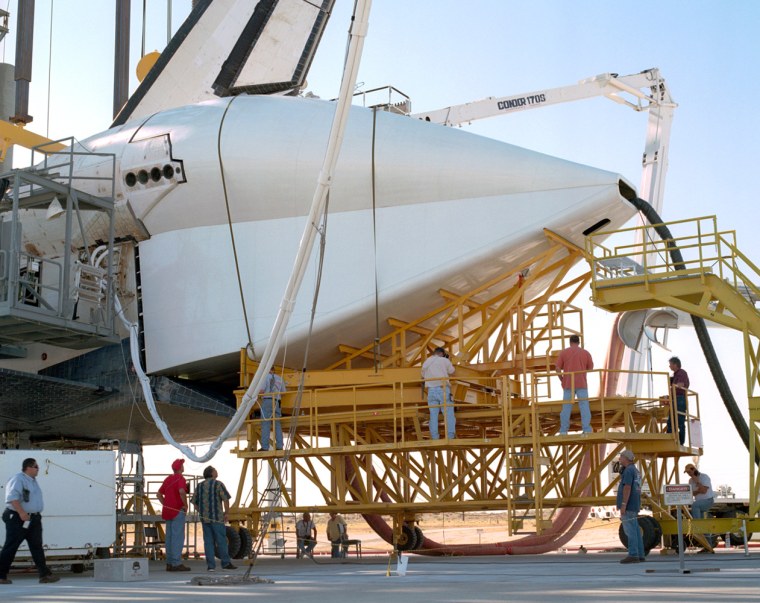Because of the repercussions of the shuttle Discovery's fuel tank problems, NASA is adjusting its plans for the next launch to come in March or later.
What's more, the next shuttle mission would not involve the shuttle Atlantis, as previously planned, but another turn for Discovery instead, according to reports received by NBC News.
NASA's associate administrator for space operations, Bill Gerstenmaier, is to discuss the shuttle fleet's shifting schedule at a Thursday news conference — but the outlines of the new schedule have already become clear as teams involved in preparations for the next mission begin to focus on the work ahead.
Task schedules are being revised to give NASA workers as well as shuttle contractors a more realistic idea of what needs to be done by when.
The key sticking point has to do with the shuttle's external fuel tank: NASA mission managers and even Discovery's astronauts were surprised to see a large piece of the tank's foam insulation breaking off after the July 26 launch, even though engineers had spent two years trying to reduce the risk of foam debris.
Just after Discovery's landing last week, Gerstenmaier said the previous schedule, which called for an Atlantis launch in September, was virtually impossible to meet due to the additional engineering changes that would be required. There had been talk of a November opportunity, but NASA decided to pass up that brief launch window as well, according to the latest reports.
Part of the delay is due to the mere logistics of shipping tanks back and forth between NASA's Kennedy Space Center in Florida and the Michoud Assembly Facility in Louisiana, where the tanks are built and serviced, NBC News space analyst James Oberg reported. Oberg received reports on the schedule shift from several sources, who shared them privately because they were not authorized to release them to news media.
The modified schedule would have Discovery rather than Atlantis taking on STS-121, the next scheduled mission to the international space station.
NASA Watch, an independent online news site, reported last week that planners at the space agency were considering a schedule shift — and on Wednesday it said the agency was working toward a March launch for Discovery and formulating plans for an Atlantis mission, now designated STS-115, in May 2006.
First flight since Columbia
Discovery's just-concluded mission, STS-114, marked the first shuttle flight since the loss of the shuttle Columbia and its crew in February 2003. The mission's twin goals were to resupply the international space station and to test the upgraded safety procedures that were put into place after the Columbia tragedy.
Dozens of cameras monitored Discovery's ascent. In fact, it was a new camera mounted on the fuel tank that caught the crucial view of the foam breaking away from a part of the tank known as the protuberance air load ramp, or PAL ramp.
Although the flying foam caused no damage to the orbiter, the incident led NASA to suspend future shuttle flights until the problem was fixed. Mission planners also decided to transfer more supplies to the space station to help the outpost's two-man crew weather a reduced resupply schedule. The space station should have sufficient supplies even if the next shuttle flight is delayed until March, thanks to Discovery's delivery as well as additional cargo slated to arrive on unmanned Russian spacecraft.
Delayed in California
While NASA reworks the shuttle's external fuel tank, the Discovery orbiter will have to undergo weeks of refurbishment in its "garage" in the Orbital Processing Facility at Kennedy Space Center for weeks of refurbishment — and there have been delays on that front as well.
Because of weather concerns, the shuttle had to land at a California backup site rather than at the main Florida facility last week. In such situations, the orbiter must be mounted atop a modified Boeing 747 jet for a piggyback flight back to Florida — but the operation has been held up, first by weather, then by a mechanical snag.
NASA reported Wednesday that workers had a hard time aligning the shuttle's protective tail cone for the trip. As a result, the scheduled two-day journey is due to begin no earlier than Friday.
